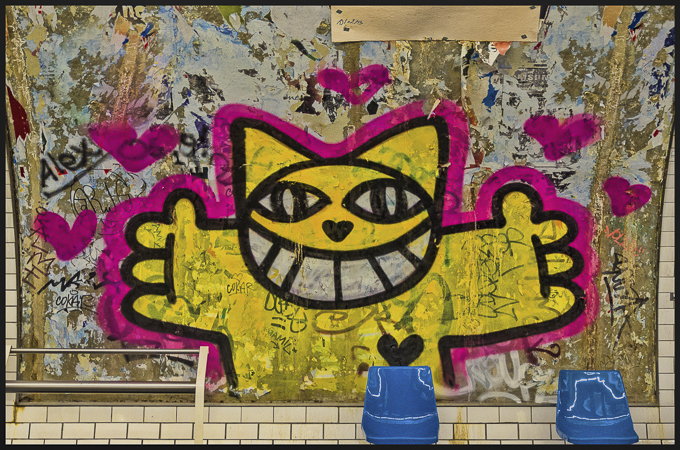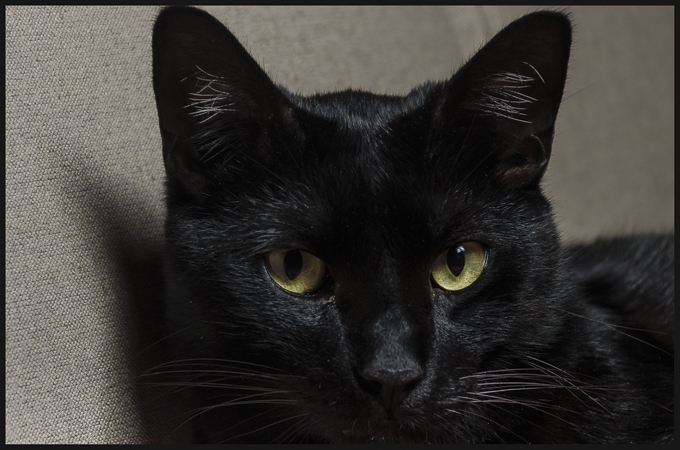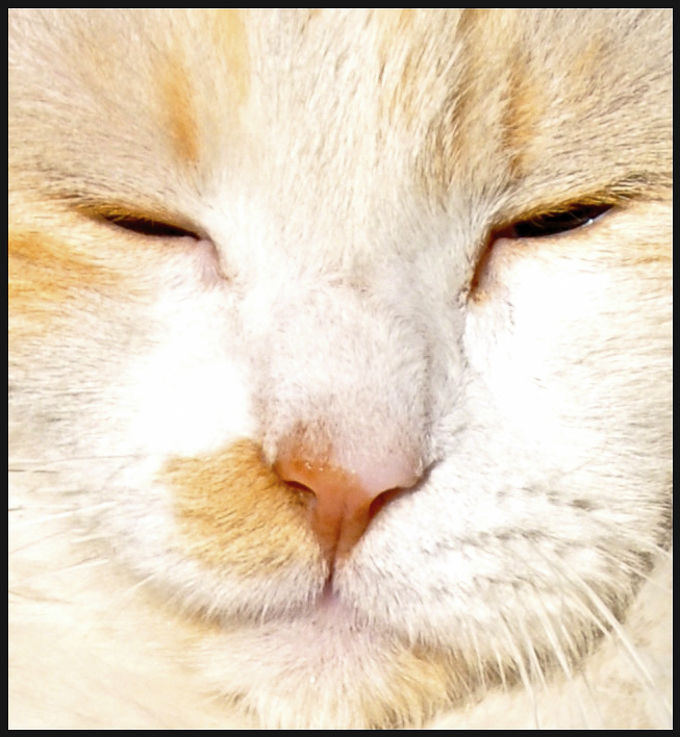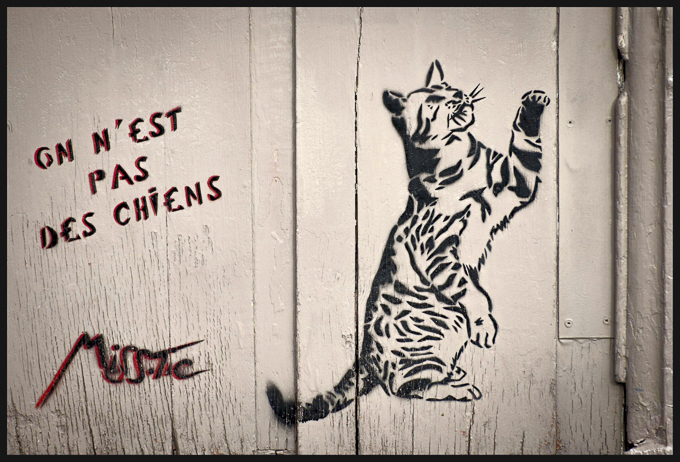Cats, Gods and Fiction
 08.27.2014
08.27.2014
 Artwork © 2014 M. Chat
Artwork © 2014 M. Chat
Character: it fascinates me. It’s the chief thing I look for in fiction, a profound understanding of human character at the level of depth of Anton Chekhov’s, or Fyodor Dostoyevsky’s, or Virginia Woolf’s, or Marcel Proust’s fiction.
I recently re-read Chekhov’s My Life and Other Stories. These stories are not so much about plot or language as they are about character, deeply felt and seen.

Character: it is as distinct, as particular in animals as in humans. We have a Dostoyevsky character staying with us for a while. He is dark, silent, taciturn. If you were to describe him as a god, he’d be the panther god, Dionysus. His name is Streak.
We are fascinated by how different he is in nature from our late cat, Marley. Marley was light, talkative, affectionate. He didn’t favor either of us—he simply wanted to be as close to one or the other as he could get. When we had friends over, he wanted to be one of the guests, was happiest when we set out a chair for him at the table.

If you were to compare Marley to a character in fiction, he’d be Samoylenko in Chekhov’s story, “The Duel.” If he were a Greek god, he’d be Apollo; he inspired poems from both of us.
I’ve been thinking lately that I’d like to see more stories that include not just human characters but animals and gods. Guess I’ll have to write some.
 Artwork © 2014 Miss-Tic
Artwork © 2014 Miss-Tic
 Chekhov,
Chekhov,  Dostoyevsky,
Dostoyevsky,  Greek myth,
Greek myth,  Proust,
Proust,  Virginia Woolf,
Virginia Woolf,  cats,
cats,  character,
character,  writers,
writers,  writing in
writing in  Paris Life
Paris Life 

Reader Comments (10)
Ah, Marley. Just one glance at that beautiful face slays me.
Wish I were bright enough and well read enough to compare cats to literary characters. So well done. So….shaming!
And I long to steal every picture that Richard ever took.
Purr fect. If anyone could write it, it would be you. Stealth & agility is yours, pounce on it. ;-)
Ah, Anna,
Same here. I remember our fiction workshop with Marley always so glad to see you and others around the table. He was our muse, I think.
I just re-read The Duel, so it's easy to recall. This particular fictional character, Samoylenko, had the same male gruffness as Marley, which (initially) hid a sunny disposition and loving heart.
You CAN! Steal Richard's pictures, that is. If you see one you want, tell him, and he'll download it for you.
What a constant friend you are, Anna.
Much love,
Kaaren & Richard
Dear Joanne,
Thank you so much for this recipe for writing: become a cat! I will work on it. What an inspiring thought. We so appreciate your commenting.
Love to you, and more paintings please,
Kaaren & Richard
Wonderful...yes, find the stories that are percolating from this imaginative place. I'm reminded of a sign on a garden gate where I walk that reads "Chien Lunatique" ... and how much this post reminds me of magic, secret gardens... and stories of interesting characters, animals and humans alike, wandering and lurking, plotting adventures...
And these cat faces are so sweet, paired with mythic characters...my sense is that some narrative are calling you through these that have just come to light... how about simply following them? I want to read these stories!
When we first moved to Playa del Rey, everyone was saying: "Jerome is back." "Who's Jerome?" we asked. It didn't take long to find out. Down our walk street came striding the most majestic, king-of-his-domain cat I had ever seen. He was big, he was slate gray, he had enormous jowls and a distinctly "don't mess with me" attitude. It seems Jerome returned regularly, no one knew from where, and in the usual gestation time, many slate gray kittens with enormous jowls popped up. This was way back in the sixties. Jerome is long gone, but his mark is still on the neighborhood. Saw a slate gray cat roaming (and hunting) the other day. Same unmistakable authority about him, same jowls. Jerome lives.
Dear Carole,
Thank you for your good wishes! It's odd the way, when you focus on something, you find examples of it all around you. I just read a Paris Review interview with Ursula K. Le Guin, in which she mentioned Virginia Woolf's novel, Flush, told entirely from the point of view of Elizabeth Barrett Browning's dog, Flush. It's one of the few novels by VW I "forgot" to read, so will order it from Shakespeare & Company.
I mixed the mythical and the realistic in my novel about Berkeley in the Sixties, and now want to try it in short stories.
I so appreciate your taking the time to comment!
Much love,
Kaaren & Richard
On a Cat Story
To be not marvelled at, but believed
Retold by JEAN COCTEAU (in Journal d'un Inconnu, translated in my version as Diary of an Unknown, Paragon Press...)
As far as I know, Keats' cat story has never been written. It has been passed down by word of mouth, changing as it goes. There are a number of versions about, but the mood is always the same. A mood so subtle that I wonder if that is not why the story better fits speech, with its leisureliness, than the pen, which is impatient.
These are the facts : Keats was to go to the village of F. to lunch with a friend who was the parson there. He had to cross a forest. On horseback, he lost his way in it. Dusk made the labyrinth inescapable. Tying his horse to a tree, he decided to wait for daybreak, and try to find a charcoal-burner's hut where he might shelter overnight. While he was wandering round, afraid to go too far out of sight of his horse, and taking care to blaze a trail wherever he went, he noticed a light. He made his way towards that light. It came from a sort of ruin not mentioned by any guide book, that of an ancient amphitheatre, a Coliseum, a confusion of arches, steps, tumbled stone, collapsed walls, gaps, brambles. The light, which was very peculiar, quivered and lit up the dead amphitheatre. Keats went close up, slipped through a gap past a pillar, and peeped.
What he saw pinned him there with stupefaction and terror. The auditorium was occupied by hundreds of cats, side by side, like the crowd round a Spanish arena, they were milling about everywhere, miaowing at the top of their voices. Suddenly he caught the sound of miniature trumpets, and the cats were motionless at once, their phosphorescent eyes turned to the right, from where came the flickering confusion of light and shadow. The light came from torches, carried by fifty jackbooted cats, heading a procession of other cats, magnificently clad, with cat pages and heralds trumpeting, cats carrying banners and cat standard-bearers.
The procession filed right across the arena and began to wind back, when there appeared four white and four black cats, with cocked hats and swords, they too, just like the others strutting on their hind legs. These four were carrying on their shoulders a little coffin on which lay a small golden crown. Behind this came more cats, two by two, bearing cushions on which were pinned orders, the diamonds of which sparkled in the light of the torches and flashed in the moonshine. The procession wound up with drums. Keats told himself that he must be dreaming, he had fallen asleep on horseback and this was a dream. But dreams are one thing, reality another. He was not dreaming and he knew he was not. He was lost by night in a forest, he was the witness of a rite of which no man should have seen anything, and he was afraid. The moment his presence was discovered that crowd of cats would rush out of the amphitheatre and tear him in pieces with their claws. The heralds trumpeted, the standards fluttered, the coffin was borne, all in a silence made painful by those arrogant little trumpets. After one turn of the arena, the whole procession moved away. The trumpets died down. The lights were extinguished The crowd of cats left the tiers of the amphitheatre. Many of them leapt out through the breach in the wall into which Keats now made every effort to efface himself. The ruin became a ruin again, with only the moonlight to occupy it.
It was now that a much more dangerous idea than the scene he had witnessed came to Keats. It was that he would not be believed. This was a story he would never be able to tell. It would be classified as a poet's falsehood. Now, Keats knew that poets do not tell lies. They bear witness. [And he knew] that it is believed that they do lie. And he became frantic, at the thought a secret like this would remain his property, that he would never be able to relieve himself of it, sharing it with other men. A catafalque of loneliness.
Shaking himself, he went back to his horse. resolved to leave the forest, whatever it cost him. He then succeeded in reaching the parsonage, where he was no longer expected.
The parson was a very cultivated man. Keats had great respect for him, considering him, indeed, competent to understand his poems. He told his story, but without referring to the amphitheatre of cats. The parson had been in bed, and had got up again. The parson's valet was asleep. The parson laid a meal for Keats. Keats ate in silence. The parson was astonished to find him so distracted, and asked if he were not feeling unwell. Keats replied that he was not, but admitted that he was under the influence of a worry, the cause of which he was unable to tell. The parson gave him a friendly shake and said he certainly must explain what he meant. Oysterlike, Keats wriggled, but in the end the parson got him to give way, for once his guest had admitted that his anxiety was he would not be believed, the parson promised to believe him. Keats was not satisfied with a mere promise, but made the parson swear over the Bible. This however the parson could not do. But he did declare that his promise as a friend was really quite as good as the oath of a priest.
"I am all ears," he said, and lay back in his armchair, smoking his pipe.
Keats was about to tell, when he thought better of it. Fear overcame him again. The parson, now very interested, had to let him have his way and say nothing, in order to free his tongue. But at last Keats closed his eyes and told the story. The parson listened in the gloom, the window open on the stars, the fire dying down. Keats described the ruin, the strange gathering and the strange happening. From time to time, he opened his eyes, to shoot a glance at the parson ...
Then it happened, just as sudden as a clap of thunder, without either Keats or the parson really grasping what was taking place. Keats had got to the procession, the torches, the trumpets, the pennants, the drums, and was describing the costumes, cocked-hats and high-boots. "Four white cats," he said, "and four black cats, were carrying a coffin on their shoulders. On the coffin lay a golden crown."
He had scarcely got these words off his lips when the cat which was sleeping in front of the fire arched its back. Its hair stood on end. "But that means I am now the king of the cats," it cried out in a human voice, and leapt out of the window.
- The Hand of a Stranger (Journal d'un inconnu), Jean Cocteau, Horizon Press, 1959
Ah Ruth, now THERE is a portrait of a cat. You know I think I've met many of his descendents up on the bluff in Playa del Rey. When we first moved there, Marley, who'd been king of the neighborhood in Venice, came home with pieces of one ear missing, chunks out of his side. It was the ferocious feral cats' doing, many of them slate gray, all over the streets and hiding in bushes and up on the hill. That ended his days of freedom. He lost his royal title. I am certain these terrorists were Jerome's great great grandkids. Just thugs.
Thank you so much for filling us in on Playa del Rey chat history.
Much love,
Kaaren & Richard
Good God, Daniel! What a fantastic story. More of a fairy tale than a dream. Why have I never heard this? What a marvel....
It is perfect that you know it, that you tell it. I almost wrote in the above essay that if Marley were a human, he'd be Daniel Abdal-Hayy Moore. But the match isn't exact. You are both such distinct characters.
Thank you for this exquisite tale.
Much love,
Kaaren & Richard